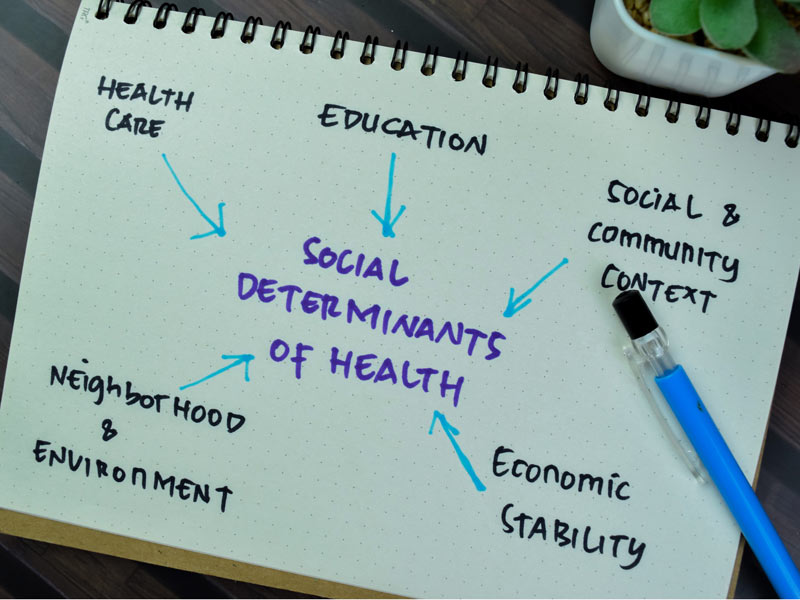Social Determinants Playbook Aims to Advance
Health Equity
Jan. 3, 2024, News Staff — A social determinants of health playbook and accompanying call to action that the Biden administration recently released can help physicians and others advance health equity by taking steps such as developing community partnerships that address population needs.

In addition, a Medicaid and CHIP framework document guides states on developing programs to address the concerns of high-need populations.
“Health equity and social needs have become increasingly important in family medicine, and these new federal resources align well with many of the Academy’s existing policies on SDOH and health equity issues,” said Juaquan Herron, diversity and inclusion manager with the AAFP’s Center for Diversity and Health Equity. “I strongly encourage AAFP members to see for themselves how the playbook and other items complement Academy resources like The EveryONE Project® and the Neighborhood Navigator.”
SDOH Materials in Detail
The playbook describes itself as “a launchpad, not a final comprehensive strategy,” for addressing SDOH. It covers current and upcoming federal work to improve public health in three pillars:
- data sharing at the federal, state, local, tribal and territorial levels;
- flexible funding to address health-related social needs and encourage coordinated use of resources; and
- developing structures to link health care systems to community service organizations.
“These actions can serve as guideposts for other agencies and organizations from every segment of society to engage in efforts to address social determinants of health and health-related social needs,” the playbook states.
Story Highlights
It also offers toolkits and guidance for health care professionals and community organizations to address social determinants.
The call to action urges collaboration among different sectors of the same community, noting that the U.S. health care system “is shifting toward identifying and addressing individuals’ social risk factors … that can contribute to poor health outcomes, including behavioral health outcomes.”
It suggests collaboration among community-based organizations, health systems and clinicians, payers, public health departments and the health IT community in areas including
- screening for health-related social needs;
- breaking down information silos and building trust to develop creative, community-based solutions; and
- identifying where health-related social needs are not being met and creating opportunities to do so.
“Everyone will need to work together to create a stronger, more integrated health and social care system that meets individuals where they are and improves equitable opportunities for the highest level of health and well-being,” the call states.
Finally, the Medicaid/CHIP framework guides states on creating programs that address issues such as housing and food insecurity.
Learn More With AAFP Resources
The AAFP first implemented a health equity policy in 2015; a position paper later outlined the role family physicians can play in advancing health equity by addressing social determinants of health.
Both before and since, the Academy has supported the tenet that all people should have the opportunity to attain the highest level of health.
Recent efforts include comments on a proposed rule on disability nondiscrimination, support for making people covered by Deferred Action for Childhood Arrivals eligible for federal health care programs; and a policy that calls for ending ableism within the specialty.
The EveryONE Project toolkit and health equity curricular toolkit help family physicians answer questions about SDOH and related matters on economics and policy.
The AAFP’s Health Equity CME offerings give family physicians strategies to address SDOH in their practices, provide better care for underserved populations, and improve their skills in recognizing and overcoming biases and inequitable behaviors.
Turning to journals, FPM contains a topic collection of articles on health equity, diversity and SDOH, while the American Family Physician’s Diversity, Equity and Inclusion content page contains a wealth of articles, blog posts and related items.
The Academy is also a strong proponent of cultural observances such as National Minority Health Month, and has actively highlighted the efforts of other groups that support SDOH and health equity
And for family physicians looking for SDOH resources they can share with patients, familydoctor.org offers several patient-friendly articles on SDOH, family health, and the intersection of culture, environment and health.
“Family medicine is a unique specialty. Our members see patients throughout the lifespan and are more cognizant of their patients’ social needs than other clinicians,” said Herron. “We recognize the gaps that exist in the realization of equal and equitable health care in this country. By providing members with resources now and in the future, we can assist FPs in addressing their patients’ needs at the point of care.”